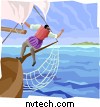I found this poem by Wordsworth while reading for my British Literature class:
WICLIFFE
ONCE more the Church is seized with sudden fear,
And at her call is Wicliffe disinhumed:
Yea, his dry bones to ashes are consumed
And flung into the brook that travels near;
Forthwith, that ancient Voice which Streams can hear
Thus speaks (that Voice which walks upon the wind,
Though seldom heard by busy human kind)–
“As thou these ashes, little Brook! wilt bear
“Into the Avon, Avon to the tide
“Of Severn, Severn to the narrow seas,
“Into main Ocean they, this deed accurst
“An emblem yields to friends and enemies
“How the bold Teacher’s Doctrine, sanctified
“By truth, shall spread, throughout the world dispersed.”
And, of course, it’s true. Wycliffe preached, “Were there a hundred popes and all the friars turned to cardinals, their opinions in matters of faith should not be accepted except in so far as they are founded on Scripture itself.” Wycliffe died, and fifty years after his death, they dug up his body, burned it, and scattered his ashes in the river Swift, a tributary of the Avon.
But Wycliffe’s views and teachings travelled to Bohemia and greatly influenced a man named Jan Hus, who was burned at the stake for teaching what Wycliffe taught first.. A century later Martin Luther wrote, “I have hitherto taught and held all the opinions of Hus without knowing it . . . We are all of us Hussites.”
Tonight we watched the movie Luther in honor of Reformation Day. I’ve been reading the book Wide As the Waters: The Story of the English Bible and the Revolution It Inspired by Benson Bobrick. Perhaps some more thoughts on translating the Bible into the languages of the common people and on the Reformation will be forthcoming soon. For now, I’m simply thankful for the great blessing I have taken for granted all my life, the blessing of being able to read God’s very Word for myself in my own language.
By the way, I’m declaring November Thanksgiving for the Saints Month here at Semicolon. (If Rebecca Writes can have Spurgeon Month, I can certainly devote a month to giving thanks for those who have served the Lord faithfully and in doing so directly and indirectly blessed me.) What thirty+ saints in the history of the church am I thankful for? Stay tuned to find out.
Today I’m giving thanks for John Wycliffe, John Hus, and Martin Luther, a triumvirate of reformers, Bible preachers and lovers of Jesus Christ who gave us, among other blessings, the concept of having the Word of God available in our very own language.
 Photo courtesy of flickr.com
Photo courtesy of flickr.com

